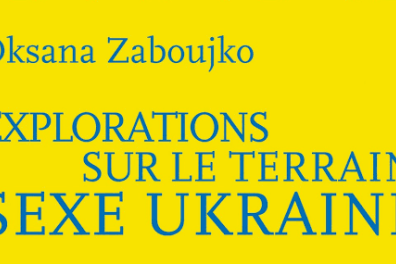Oksana Zaboujko: "Explorations on the terrain of Ukrainian sex".
Novel translated from Ukrainian by Iryna Dmytrychyn.
Lecturer in Ukrainian history. Translator in the TRM Master's program (Translation, Writing and Multilingual Mediation).

A philosophy and literature graduate, Oksana Zaboujko reflects in her fiction and press articles on Ukrainian identity and the imprint of history, but not without a feminist twist. Explorations in the Field of Ukrainian Sex was published in 1996. The first Ukrainian bestseller, it has been translated into eleven languages and adapted for the stage. One of his latest novels, The Museum of Abandoned Secrets, a family saga that crosses the destinies of several generations in 20th-century Ukraine, was recognized as best book of 2010.
The heroine of Explorations in the Field of Ukrainian Sex, who arrived in the United States to teach Ukrainian literature (the author has taught Ukrainian literature in North America, including at Harvard on a Fulbright scholarship), recalls her last unhappy love affair with a Ukrainian painter. When he joins her in the United States, the mutual recriminations resume. But this doomed relationship is only a pretext for talking about the fate of the Ukraine. This biographical fiction takes the form of a confession, a torrent of ideas reinforced by unstructured syntax. It encompasses the experiences of a family, the narrator's childhood, adolescence and life as a woman, from Soviet times to independence in 1991. The heroine presents herself, without irony, as "a sexual victim of the national idea". This interior monologue is less about a woman's story than a reflection on the struggle to be a woman, to be able to write in her mother tongue and to be free in a free country. For fear destroys everything.
Oksana Zabuzhko, talks to award-winning journalist and director of the European Literary Network, Rosie Goldsmith. (in English)
Extract from the novel Explorations in the Field of Ukrainian Sex
-"Where are you from?" - "Ukraine" - "Where is that?"
You're tired of not being of this world, tired of hanging around the house clenching between your teeth those concentrates of beauty sucked up by thirsty lips and vociferating gleefully "Come and see!". But at home, in your poor brutalized country, the country of civil servants with sagging pants and dandruff-covered jackets, the country of obese writers capable of reading a single language while forgetting to really use it, and of shrewd businessmen with snooping eyes and the mannerisms of former Komsomol secretaries, -all of which couldn't stand upright, bent over and bandaged only by the excess bile of its nebulous inaccessibility, encoded in unknown names and realities; the land of short, self-taught men (always, for some reason, with small, bowed legs like jockeys: is it genetics or what?), who marinated somewhere in some provincial library bearing the name Griomine back when you had the audacity (or did they think you had the luck of the hanged man?) to hang out in Harvard's Widiner or who knows where else. You were tired of not sharing your love for the world, and this man, no sooner had you found yourself in his studio, planted (with bifocals) in front of the canvases jostling by the wall collecting dust and unfolding one after the other, -you divined in a flash your unique and perfect chance of non solitude in this love, precisely because he was "such a damned good painter",-but it would have been a lost cause to make Lisa and Dave understand it, and you didn't even try. Impressed, Lisa smiled with her artificially red mouth that resembled a coral mollusk in a state of excitement, and her moist eyes shone: "What a story! Oh yes, a terribly romantic love story, with fires and car accidents (because one night he smashed the famous car to smithereens), with a mysterious disappearance of the protagonist and the heroine's departure across the ocean, with lots of poetry and paintings and, most importantly, that constant, penetrating, unspeakable feeling that in truth won the day: the feeling that anything is possible. This man played without rules or, more precisely, played by his rules, like a true Kantian genius, in his field of attraction all predictable logic of events became fallible, he was henceforth himself "the land of opportunities" and, whatever these opportunities might hold in the future - death in a triumphal procession in all the world's museums - nothing to worry about, it didn't matter, anything to break, to extricate oneself from the rut, from this eternal Ukrainian condemnation to non-existence.
Roman translated from Ukrainian by Iryna Dmytrychyn.
Lecturer in Ukrainian history. Translator in the TRM Master's program (Translation, Writing and Multilingual Mediation) at Inalco.
More information on the publisher's website
https://www.editionsintervalles.com/catalog/explorations-sur-le-terrain…
Other excerpts from the novel online